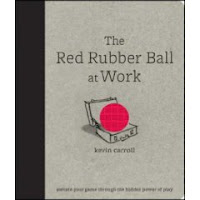
Want to know more about David Allen's new book? GTD - Making It All Work: Winning at the Game of Work and Business of Life, here is a full chapter excerpt on bNet.
More time for fun and play with your kids! My practical experiences and learning to achieve goals in life and work using ideas from GTD® or Getting Things Done®. Enjoy the questions and fun of our discoveries in the game of work and the business of life.

 A fascinating book about the serious business of play is "The Red Rubber Ball at Work". Its all about play at work. Kevin Carroll reminds us of our childhood connections to play and of how often we have forgotten how. Forgotten how to play and the fun of it all.
A fascinating book about the serious business of play is "The Red Rubber Ball at Work". Its all about play at work. Kevin Carroll reminds us of our childhood connections to play and of how often we have forgotten how. Forgotten how to play and the fun of it all.
 “Work and play are words used for the same thing under differing conditions” —Mark Twain
“Work and play are words used for the same thing under differing conditions” —Mark TwainAll good things come in three’s—just like the steps of the weekly review:
Getting work done
First get clear. Collect everything in one place—the loose bits of paper, assignments, toys, (school) books and randomly ordered thoughts. Put it all in one place, like the IN basket. Then work it down until you get it is empty.
Doing this for myself regularly keeps me in control. Similarly with my children, the effects are most obvious when I am not asked where the clean socks or trousers are—the wash-IN basket is empty.
Or where that missing library book is to be found. And when my daughter has the conversation with me about doing less English at school so that she can concentrate more on her Russian. (We speak German together at home).
The balance between work and play
Then get current. Connecting with everything and identifying what to do with or about it, is a balancing act.
This is most obvious to me in the moment of now. In reviewing everything, I know how and when to keep in balance. That careful balancing act between work and play.
“The richest and fullest lives attempt to achieve inner balance between 3 realms: work, love and play. That to pursue one realm to the disregard of the other is to open oneself to ultimate sadness in older age. Whereas to pursue all 3 with equal dedication, is to make possible a life not only with achievement but with serenity.” —Doris Kearns Goodwin.
Doris Kearns Goodwin on learning from past presidents | Video on TED.com
How often do you get to play?
Get creative. Creative ideas seem easy for kids. Wild outrageous and seriously fun things are so easy for kids because it’s most like play.
Sometimes it is also important to do just nothing. Sit out in the garden and enjoy the view of how the seasons change. Or enjoy a coffee in your favorite café—doing nothing. Not even with your notebook. Just doing nothing can be the most productive time of the day. Kids do it (almost) all the time.
“Hey what are you doing?” — “Oh? Nothing!”
 A habit is something we all have plenty of. Learning a new one takes time. Children are quick to learn but like me need time to make it their own. It takes something like 4 weeks to aquire a habit.
A habit is something we all have plenty of. Learning a new one takes time. Children are quick to learn but like me need time to make it their own. It takes something like 4 weeks to aquire a habit.